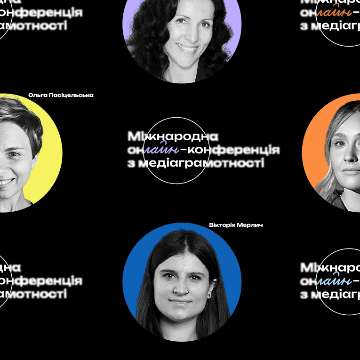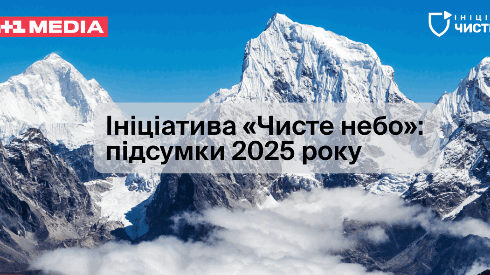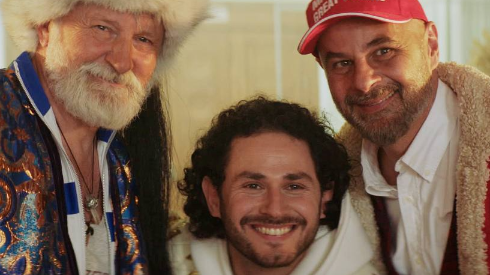
International online conference on media literacy by 1+1 media is available on YouTube
Recently, 1+1 media, together with Smart Angel, launched a new educational project - the International Online Media Literacy Conference, which took place online on 6 June.
The event was packed with knowledge on countering fakes and disinformation, protecting personal data, and tips on internet safety. The project is being implemented jointly with the Smart Angel charity and with the financial support of the European Union. Viewers can now watch the online conference on 1+1's YouTube channel here.
The lecturers' presentations are available in the format of pre-recorded speeches in English, as well as with subtitles in Ukrainian, Italian, German and French. Thus, participants can easily learn more about countering fakes, the impact of propaganda on society, and online safety in a full-scale war.
The educational project provides not only theoretical knowledge on countering disinformation, but also practical skills in media and information literacy. The topics covered include:
"History as a weapon: how Russia manipulates history to achieve its goals" - Akim Galimov, producer at 1+1 media, founder of the Real History project.
For centuries, Russia has used all possible tools to influence the masses: from traditional media to culture and history. Akim Galimov will examine how Russia manipulates historical facts to promote propaganda narratives. The audience will see real-life examples of historical distortions and learn why a terrorist country uses them.
"The influence of Russian propaganda on the Ukrainian media space" - Anton Shekhovtsov, professor at the University of Vienna, expert at the Centre for Democratic Integrity and researcher at the Research Centre for the History of Transformation, will discuss Russian influence and right-wing radical movements.
Russian narratives are spread in the information space for different purposes and to different target audiences. One of the main audiences of Russian propaganda is Ukrainians, including those living abroad. The speaker will analyse how hostile narratives and disinformation affect Ukrainian society and explain how the main tools to counter them work.
"Digital literacy in a full-scale war" - Valeria Ionan, Deputy Minister of Digital Transformation of Ukraine for European Integration.
Ukraine is a global leader in digitalisation: we implement the most advanced technological standards of documentation in government agencies - it was in our country that digital passports were first recognised as valid on a par with paper ones. Valeriia Ionan will demonstrate the achievements in the development of digital literacy using the Diia app as an example.
"How to look for verified information on how to act in emergencies in the flood of advice" - Victoria Merlych, Head of Project Management at the Centre for Strategic Communications.
It is important to be prepared for emergencies - to have instructions on how to act if something happens. The speaker will talk about the experience of launching Dovidka.info as a security guide and a reliable source of information in the context of a full-scale war.
"The post-truth era. Causes and solutions" - Gabriele Cosentino, Professor of Journalism and Mass Communication at the American University in Cairo.
What is the post-truth era? Why do we live in a world where emotions have become more important than facts? And how does modern society use and process information? Gabriele Cosentino will answer these questions.
"Every genocide is preceded by propaganda. How Russian propagandists prepared the ground for the war in Ukraine" - Ihor Solovey, Head of the Centre for Strategic Communications.
Genocidal rhetoric is one of Russia's communication tools to justify and "justify" a full-scale invasion of Ukraine with the aim of exterminating Ukrainians as a people. The speaker will explain why it is important for other countries to recognise Russia's actions as genocide, and what results we have already seen.
"Media literacy on the Internet: challenges and ways to counter disinformation" - Kari Kivinen, Head of Education at Faktabaari.
The Internet has become the main communication platform and news source around the world. Due to the ease of access and the ability to generate content easily, we are increasingly faced with the phenomena of disinformation, distortion of facts and information manipulation. Kari Kivinen will tell us how to combat these phenomena and how to develop media literacy online.
"The Psychological Impact of Propaganda" - Lidia Smola, Doctor of Political Science, Professor, researcher of information wars.
Lidia Smola will analyse the phenomenon of propaganda from the very sources and explain why it is really difficult for society to distinguish truth from disinformation. The speakers will also talk about the importance of critical thinking and information hygiene.
"Media literacy for older people (60+)" - Olga Pasicelska, researcher at the Centre for Media Studies and Journalism, University of Groningen, the Netherlands.
Are older people more vulnerable to propaganda than younger generations? Using the example of an audience study, Olha Pasicelska will talk about the peculiarities of media literacy for people aged 60+, whether it is possible to develop it in them, and what ways will help them filter information efficiently and easily.
"Trust in communications in a disinformation environment" - Taras Shevchenko, Deputy Minister of Culture and Information Policy of Ukraine.
Competent work with information and the development of general media literacy of society should be integrated into the activities of state institutions, especially during the war. Taras Shevchenko will share the Ukrainian experience of improving the information resilience of the people and countering the enemy's disinformation campaigns.
You can watch the full reports of the lecturers free of charge on the 1+1 YouTube channel here.
This material was prepared as part of the "Comprehensive Information and Awareness Campaign to Counter Disinformation" implemented by 1+1 Media and Smart Angel in cooperation with expert organisations with the financial support of the European Union. Its contents are the sole responsibility of the programme's editorial team and do not necessarily reflect the views of the EU.

